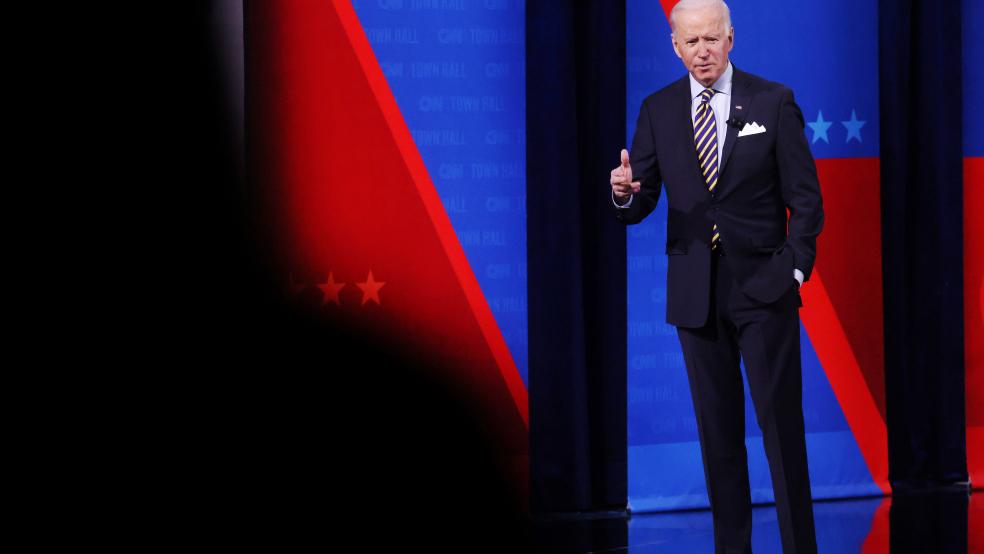President Biden made news on a number of fronts at his Tuesday night CNN town hall in Milwaukee. Here’s a quick recap.
A goal for vaccinations, and some normality: Biden said that by the end of July we’ll have more than 600 million doses of Covid-19 vaccine available, “enough to vaccinate every single American.” That echoes comments made last week, when Biden announced deals to buy another 100 million doses each of the Pfizer and Moderna vaccines, a 50% boost to supply. Even with those deals, though, Biden warned last week that “gigantic” logistical issues meant that many Americans likely won’t be vaccinated by the end of the summer. At Tuesday’s town hall, he said that he didn’t want to overpromise, but expected that “by next Christmas, I think we’ll be in a very different circumstance, God willing, than we are today.”
A benchmark for his $1.9 trillion Covid relief plan: Biden said that there’s an “overwhelming consensus” among economists of all political stripes that a large relief plan is the right way to go. “In order to grow the economy a year or two, three, and four down the line, we can’t spend too much,” he said. “Now is the time we should be spending. Now is the time to go big.” He also said that economists estimate that if his plan passes, the U.S. will create 7 million jobs this year.
Biden may be overstating the consensus somewhat, but with Democrats likely to pass the relief package within weeks, expect that 7 million jobs figure to be used as a political measuring stick as people judge the legislation’s success or failure.
A hard no on $50,000 in student loan forgiveness: Senate Majority Leader Chuck Schumer (D-NY) and progressive Democrats are pushing the Biden administration to cancel up to $50,000 of federal student loan debt per borrower by executive action. Asked by a town hall audience member what he will do to forgive at least $50,000 of student debt, Biden forcefully shot down the idea. "I will not make that happen," he said.
Biden explained that, while he understands that student debt can be debilitating and he’s prepared to cancel up to $10,000 per borrower, he doesn’t believe he has the authority to wipe out $50,000 by executive action.
Schumer and Sen. Elizabeth Warren (D-MA) responded Wednesday by urging Biden to press ahead. “Presidents Obama and Trump used their executive authority to cancel student loan debt. The Biden administration has said it is reviewing options for cancelling up to $50,000 in student debt by executive action, and we are confident they will agree with the standards Obama and Trump used as well as leading legal experts who have concluded that the administration has broad authority to immediately deliver much-needed relief to millions of Americans,” they said in a joint statement.
On plans for school reopenings: Biden said his goal is to open the majority of K-8 schools by the end of his first 100 days in the White House — and by “open,” he said, the goal would be for five days a week in person. White House Press Secretary Jen Psaki said last week that the administration’s goal was to have most schools open at least one day a week in person. Biden called that “a mistake in the communication.”
Defending a $15 minimum wage, but open to negotiations: In response to an audience member’s question about small business concerns over the cost of a higher minimum wage, Biden emphasized that his proposed increase from $7.25 to $15 an hour would be gradual, and that phasing in wage increases would lessen the effect on business owners. He also disputed a recent Congressional Budget Office estimate that a $15 minimum wage would cost 1.4 million jobs, even as it would lift 900,000 people out of poverty. “I think there is equally as much, if not more, evidence to dictate that it would grow the economy and, long run and medium run, benefit small businesses as well as large businesses, and it would not have such a dilatory effect,” Biden said. “But that’s a debatable issue.”
It’s not clear yet whether the $15 proposal will be included in the final version of the relief package being crafted by Congress. Psaki said Wednesday that the $15 minimum wage is important to Biden, but that it will be up to lawmakers to determine what the legislation looks like.
Republican Sens. Mitt Romney of Utah and Tom Cotton of Arkansas plan to introduce their own minimum wage legislation. “Our proposal gradually raises the minimum wage without costing jobs, setting it to increase automatically with inflation, and requires employers to verify the legal status of workers,” Romney tweeted Tuesday.





